Building a new product often feels like a high-stakes gamble. You invest significant time and resources, hoping your big idea resonates with customers. But what if you could test your core concept and gather user feedback before going all-in? This is the power of a Minimum Viable Product (MVP). An MVP isn't just a half-finished product; it's a strategic tool for learning.
This guide moves beyond generic definitions to provide a deep dive into real-world minimum viable product examples. We will analyze how now-famous platforms like Amazon, Product Hunt, and Coursera started with surprisingly simple versions to validate their core assumptions. The goal of an MVP is to answer one critical question with minimal effort: does anyone actually want this? To truly understand the core philosophy behind successful MVP development, it's essential to explore lean operations principles that emphasize efficiency and value creation.
Each example below is more than just a success story. We break down the specific problem they aimed to solve, the exact MVP strategy they used, and the actionable takeaways you can apply to your own projects. You'll find direct links and analysis to see how these giants started small, learned fast, and built momentum from day one.
1. Strategyzer
For teams that want to move beyond the theory of MVPs and into structured, evidence-based experimentation, Strategyzer is an indispensable resource. Rather than just being a collection of success stories, it’s a platform built around a core library of over 40 distinct experiment types. This focus on process makes it one of the most actionable minimum viable product examples of a resource hub available today.
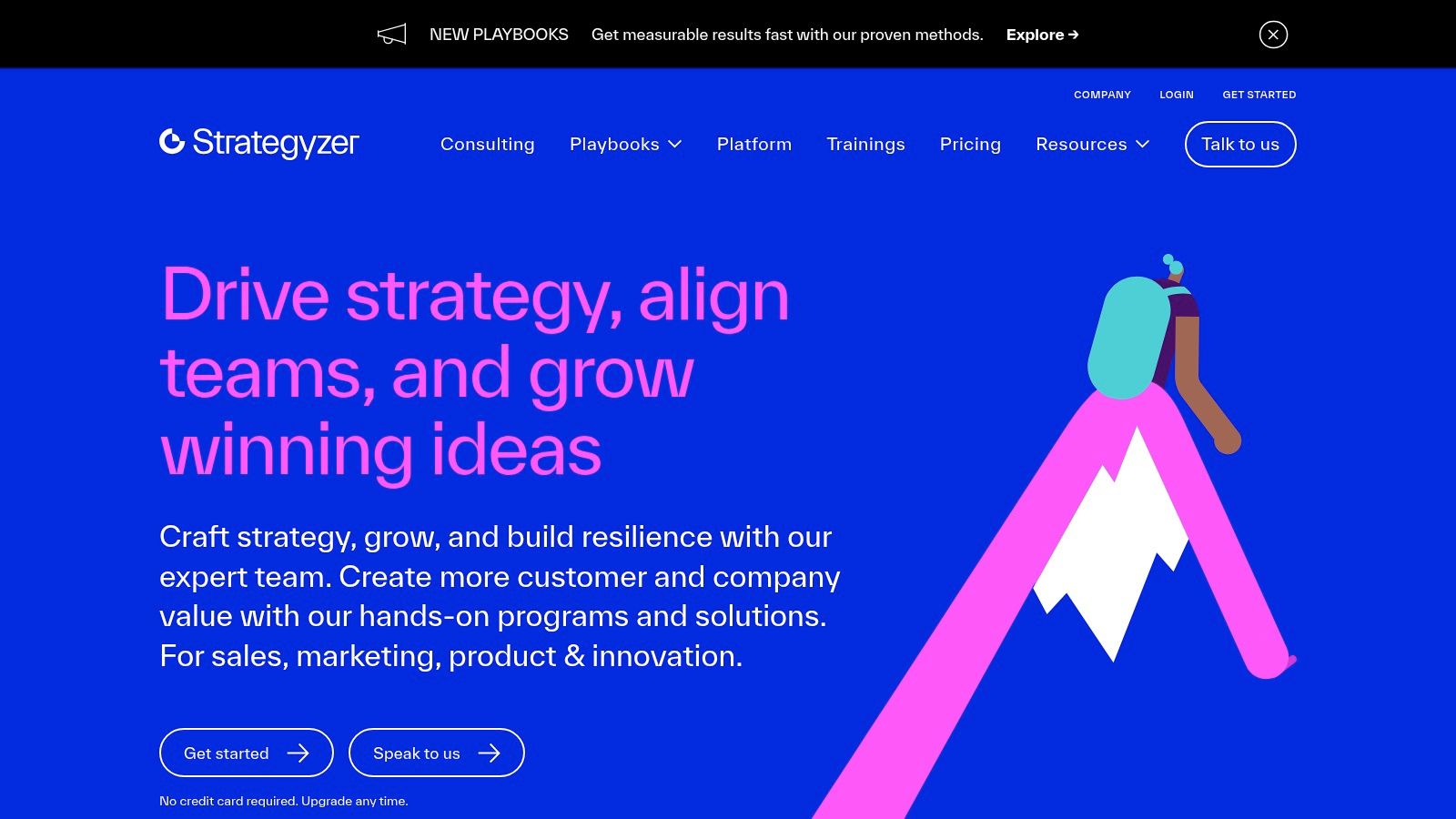
Strategyzer's true value lies in how it guides you from a raw idea to a validated learning. It directly integrates with foundational tools like the Business Model Canvas and Value Proposition Canvas, helping you pinpoint your riskiest assumptions first. From there, its Experiment Library allows you to filter validation techniques by cost, time commitment, and the strength of the evidence they generate. This systematic approach demystifies the process of choosing the right experiment for your specific stage.
Strategic Breakdown & Key Features
Strategyzer excels by providing a clear, repeatable framework. Instead of guessing, teams can follow a prescribed path to test their ideas efficiently.
- Experiment-First Orientation: The platform’s core is its library of validation patterns, from simple ad trackers to more complex concierge MVPs. Each comes with a recipe for execution.
- Integration with Core Tools: It connects seamlessly with the Business Model and Value Proposition Canvases, ensuring your experiments are always tied to core business assumptions.
- Real-World Context: Each experiment type is illustrated with snippets from well-known companies like Dropbox, Zappos, and Airbnb, showing the pattern in action. This helps connect the dots between method and outcome.
- Structured Guidance: The platform offers step-by-step instructions, helping you choose and design your next experiment based on what you need to learn. For those looking to dive deeper into building these tests, you can explore various rapid prototyping methods.
Access and Pricing
While Strategyzer offers a generous amount of free content, including an 88-page book preview and access to some tools, its most powerful resources are part of a paid subscription. Access to the full platform, including all masterclasses and templates, requires a Strategyzer Pro account, with pricing geared towards professional teams and enterprises.
Website: https://www.strategyzer.com
2. Harvard Business Publishing (HBR Store/Education)
For teams seeking authoritative, in-depth case studies on business strategy, Harvard Business Publishing is the gold standard. It provides direct access to the official Harvard Business School cases used in top MBA programs, including deep dives into the decisions behind some of the most famous minimum viable product examples like Dropbox. This makes it an invaluable resource for structured learning, workshops, and strategic planning.

The platform's unique value comes from its academic rigor. Unlike blog posts or summaries, these cases present detailed data, explore the trade-offs founders faced, and frame the narrative around critical decision points. For instance, the Dropbox case study meticulously breaks down their validation process, from the simple explainer video MVP to their freemium model decisions. This level of detail allows teams to go beyond the "what" and understand the "why" behind successful MVP strategies.
Strategic Breakdown & Key Features
Harvard Business Publishing excels by offering primary-source material that encourages deep strategic analysis rather than passive reading. The cases are designed to be debated and dissected.
- Authoritative Primary Case Studies: Access downloadable PDFs of official HBS cases that detail the growth, freemium, and validation decisions of real companies.
- Deep Dives into MVP Decisions: The materials provide a granular look at the assumptions, experiments, and pivots that shaped early-stage product development.
- Structured for Learning: Cases often include discussion prompts and teaching questions that are perfect for guiding a team workshop or a strategic offsite. This complements frameworks like the Lean Canvas by providing real-world context.
- Reliable and Credible: Each case comes with reliable metadata, including authors, publication dates, and length, ensuring you are working with well-vetted, high-quality information.
Access and Pricing
The platform operates on a pay-per-case model, which is ideal for targeted learning. Most individual cases are available for purchase on demand, typically priced between $8.95 and $14.95. While the comprehensive teaching notes that accompany cases are usually restricted to registered educators, the case studies themselves provide more than enough substance for any professional team.
Website: https://hbsp.harvard.edu
3. Product Hunt
For teams seeking a real-time, unfiltered look at how products are launched and validated, Product Hunt is an essential daily resource. It’s a dynamic showcase where founders present their creations to a savvy, early-adopter community. This makes it a living library of minimum viable product examples, offering a direct view into how new ideas are positioned, tested, and received by their first users.
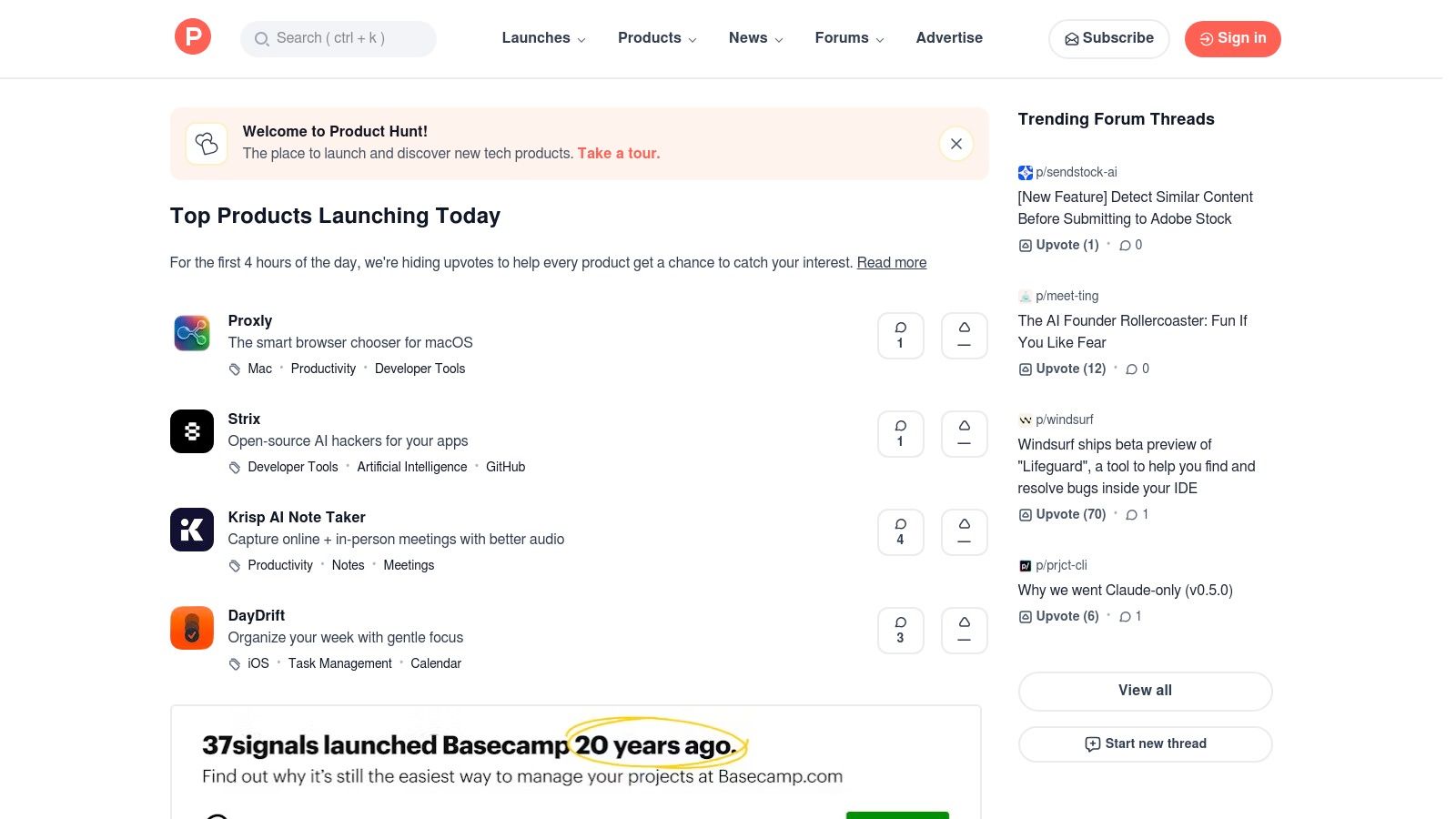
Product Hunt's core value is its transparency. You can see not just the final product but the initial pitch, the first tagline, and the immediate user feedback through upvotes and comments. This allows you to observe how founders test their value propositions in the wild. By analyzing which products gain traction and which don't, you can reverse-engineer successful launch strategies and identify patterns in messaging and feature prioritization that resonate with an audience primed for new technology.
Strategic Breakdown & Key Features
Product Hunt serves as a powerful market validation tool, offering raw insights directly from a relevant user base. It helps teams understand the competitive landscape and refine their own launch narrative.
- Real-Time MVP Showcase: The platform features a daily feed of new product launches, providing an endless stream of inspiration for positioning, copywriting, and feature sets.
- Community Validation Mechanism: The upvote and comment system acts as an immediate, public-facing focus group. It reveals what excites early adopters and what questions or concerns arise.
- Direct Founder Interaction: Observe how founders answer questions, handle criticism, and pivot their messaging based on initial feedback. This is a masterclass in early-stage community engagement.
- Inspiration for User Research: The comments section is a goldmine for understanding user pain points and desires. You can gain valuable insights by learning more about how to conduct user research.
Access and Pricing
Product Hunt is entirely free to access, browse, and participate in. Anyone can create an account to upvote, comment on, and submit products. While some listed products may have their own pricing models, the platform itself serves as a free, open-access community for product discovery and validation.
Website: https://www.producthunt.com
4. Indie Hackers
For anyone looking for raw, unfiltered minimum viable product examples, Indie Hackers is an essential destination. It moves beyond polished case studies and into the messy, real-world trenches of building a business. The platform is a massive, living archive of founder interviews, milestone posts, and community discussions, all centered on the journey of bootstrapping a product from zero to one and beyond.
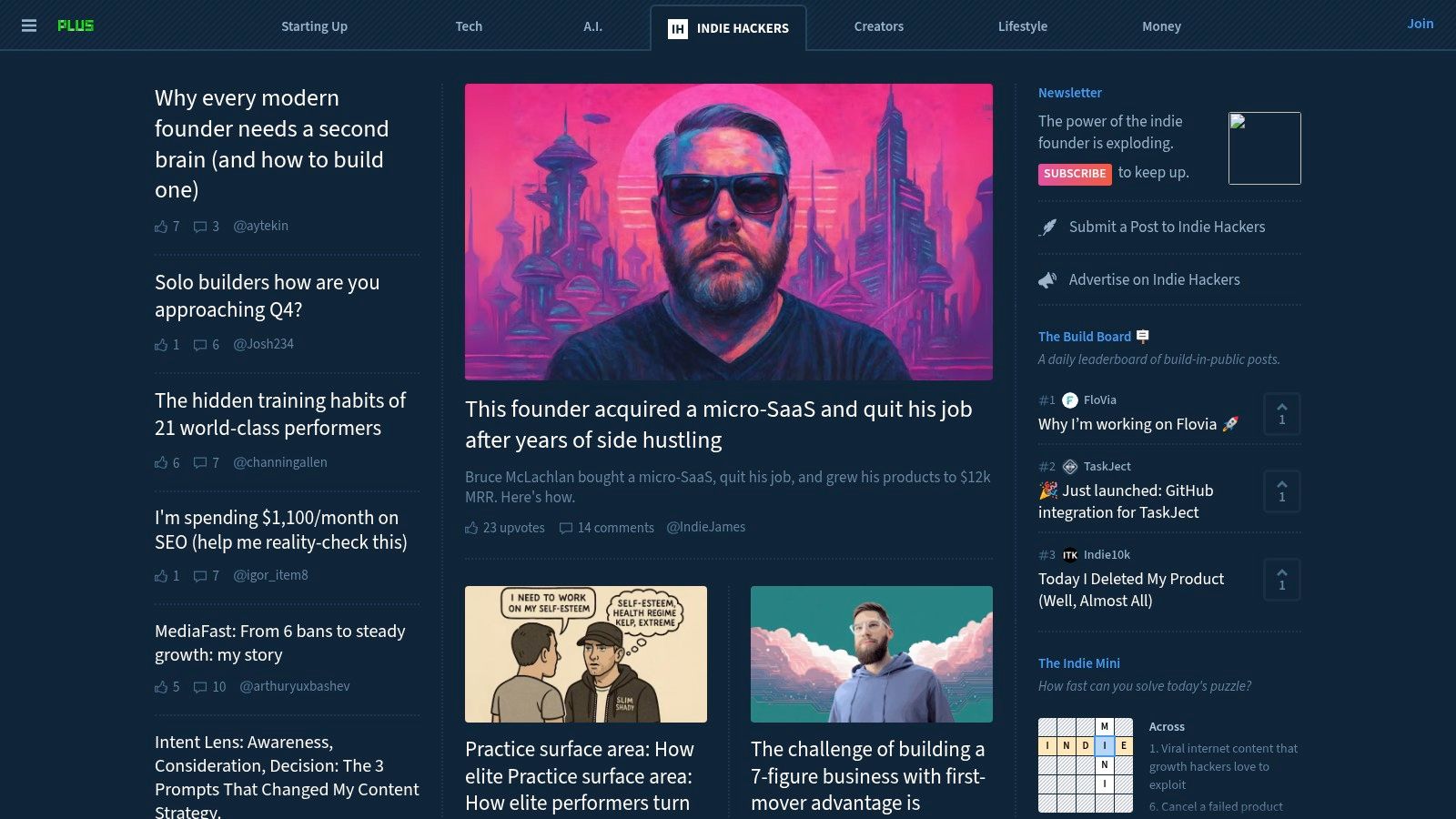
Unlike academically curated resources, Indie Hackers provides a ground-level view of how founders actually validate their ideas. You can read firsthand accounts of how an MVP was built over a weekend, what initial user feedback looked like, and which specific tactics were used to get the first 100 customers. The community aspect is also critical; founders openly share revenue numbers, failed experiments, and pivotal decisions, inviting feedback and fostering a culture of transparent learning. This makes it an invaluable resource for seeing theory applied in real-time.
Strategic Breakdown & Key Features
Indie Hackers' strength is its authenticity. It offers a playbook written by those currently playing the game, providing tactical insights that are often hard to find elsewhere.
- Real-World Case Studies: The site is built on founder-submitted posts detailing everything from initial MVP mockups to scaling challenges. These aren't just success stories; they include candid timelines and discussions of trade-offs.
- Milestone Filters: Users can easily filter content to find examples of product launches, validation phases, or specific revenue milestones (e.g., reaching $1k MRR), allowing them to study the exact stage they are in.
- Active Community Feedback: Every post is a potential conversation. Founders receive direct feedback, questions, and suggestions from other experienced builders, adding another layer of practical insight to each story.
- Transparent Metrics: Many founders share screenshots of their analytics, revenue dashboards, and early marketing results, offering concrete data to back up their narratives.
Access and Pricing
Indie Hackers is completely free to access. All interviews, forum posts, and community features are available without a subscription, making it one of the most accessible and high-value resources for aspiring entrepreneurs and product teams. Users can create a free account to participate in discussions and share their own journey.
Website: https://www.indiehackers.com
5. Amazon
For teams and entrepreneurs looking to build a foundational knowledge of MVP theory, Amazon serves as the definitive library. It’s not a platform for building MVPs, but rather a crucial starting point for understanding the philosophies behind them. Its vast collection of books offers deep dives into frameworks, case studies, and practical guides, making it one of the most comprehensive minimum viable product examples of a knowledge base.
Amazon's primary value is its sheer breadth and accessibility. You can find everything from seminal works like The Lean Startup to niche playbooks on product-market fit. This allows individuals and teams to self-educate and absorb the core principles before writing a single line of code or spending a dollar on development. The platform’s review system acts as a crowdsourced filter, helping users identify high-quality, actionable content.
Strategic Breakdown & Key Features
Amazon excels by democratizing access to expert knowledge. Instead of relying on fragmented blog posts, teams can purchase and study structured, in-depth resources from proven industry leaders.
- Extensive Selection of Titles: The platform features a massive catalog of books on lean startup, MVP development, and product management, including essential reads like The Lean Product Playbook.
- Multiple Formats: Content is available in various formats to suit different learning styles, including Kindle for digital reading, traditional print for easy reference, and audiobooks for learning on the go.
- Customer-Driven Curation: The customer review system allows you to gauge a book's usefulness and practical value before purchasing, helping you avoid theoretical fluff and find tactical advice.
- Quick & Convenient Purchasing: With features like one-click ordering and Prime shipping, teams can acquire critical learning materials quickly and efficiently, without bureaucratic delays.
Access and Pricing
The resources on Amazon are available for individual purchase. Prices vary significantly depending on the book's format (Kindle, paperback, hardcover, audiobook) and popularity. While there's no subscription model for this type of content, services like Kindle Unlimited or Audible can provide access to a selection of relevant titles for a monthly fee.
Website: https://www.amazon.com
6. Coursera
For founders and product managers who prefer a formal, university-backed approach to learning, Coursera offers a structured path to mastering MVP principles. Instead of just providing tools, Coursera delivers comprehensive courses from accredited institutions, turning the abstract concept of an MVP into a defined curriculum. This academic rigor makes it a standout choice among minimum viable product examples for educational platforms.
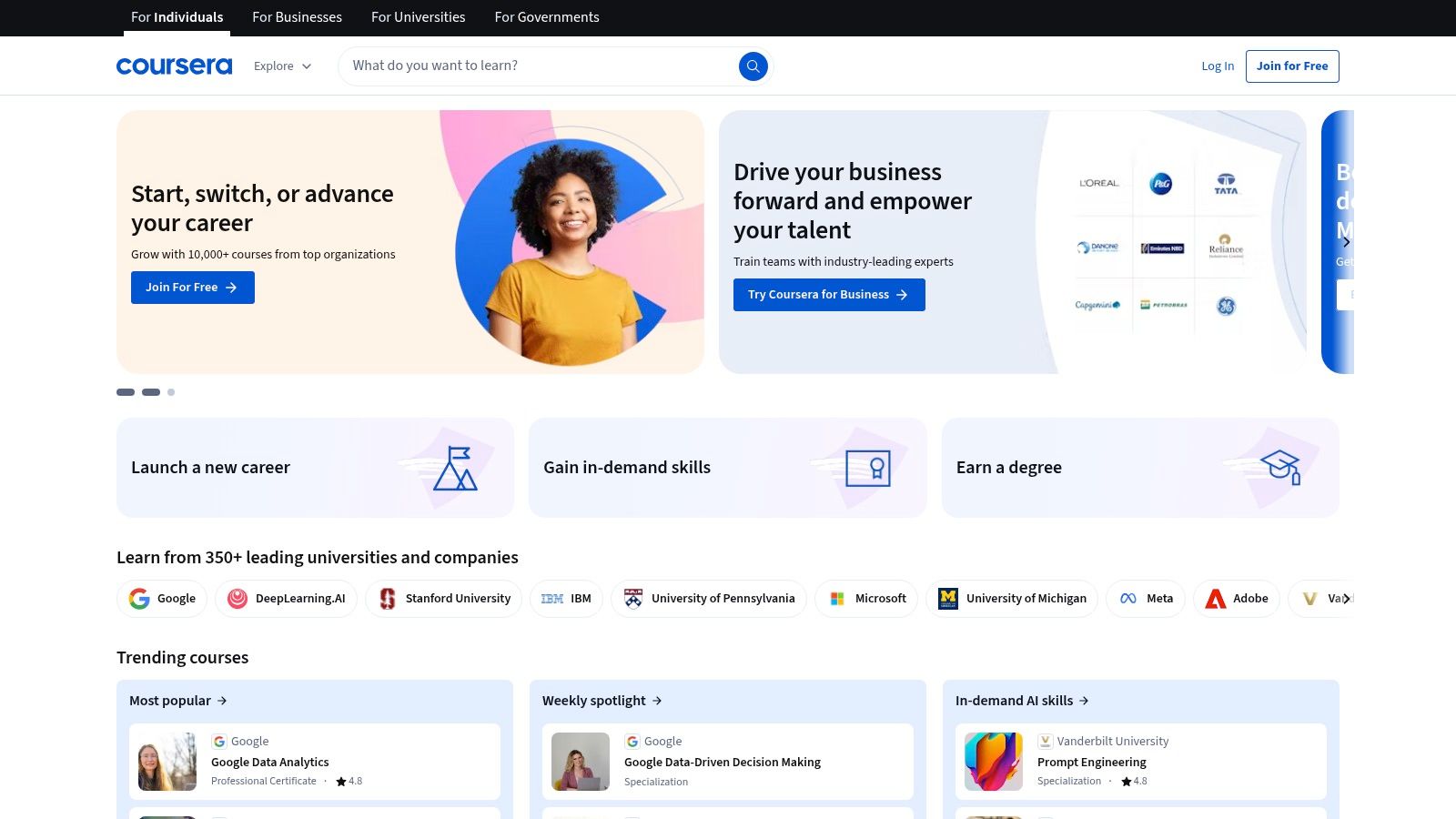
Coursera’s unique value is its ability to blend academic theory with practical application through guided projects, peer-reviewed assignments, and formal assessments. It moves beyond inspirational stories to provide a step-by-step educational journey, covering everything from identifying core assumptions to building and testing a prototype. This approach is ideal for individuals or teams looking to build a foundational, repeatable skill set in product validation.
Strategic Breakdown & Key Features
Coursera excels by providing a clear educational framework that builds knowledge progressively, ensuring learners grasp both the "why" and the "how" of MVP development.
- Structured Curricula: Courses are organized into modules with a mix of video lectures, readings, and quizzes, guiding learners from basic concepts to advanced execution.
- University-Backed Content: The platform features courses and specializations from reputable universities and companies, adding a layer of credibility and depth to the material.
- Hands-On Assignments: Many courses include practical assignments and peer-review systems, forcing learners to apply concepts and receive feedback on their work.
- Shareable Certificates: Upon completion, users earn professional certificates to showcase their expertise, which is particularly useful for those building their product management careers. The skills learned are directly applicable to creating a product roadmap template.
Access and Pricing
Many courses on Coursera can be audited for free, providing access to lecture materials. However, to earn a certificate and complete graded assignments, users must pay for the course individually or subscribe to Coursera Plus. The Coursera Plus subscription offers unlimited access to thousands of courses, making it a cost-effective option for continuous learners and corporate teams.
7. Udemy
For individuals and teams seeking practical, hands-on guidance to build their own MVPs, Udemy offers a vast and accessible learning marketplace. Instead of high-level theory, the platform provides thousands of instructor-led courses focused on the specific skills needed for execution. This makes it an invaluable resource for those looking for actionable minimum viable product examples and the step-by-step processes behind them.
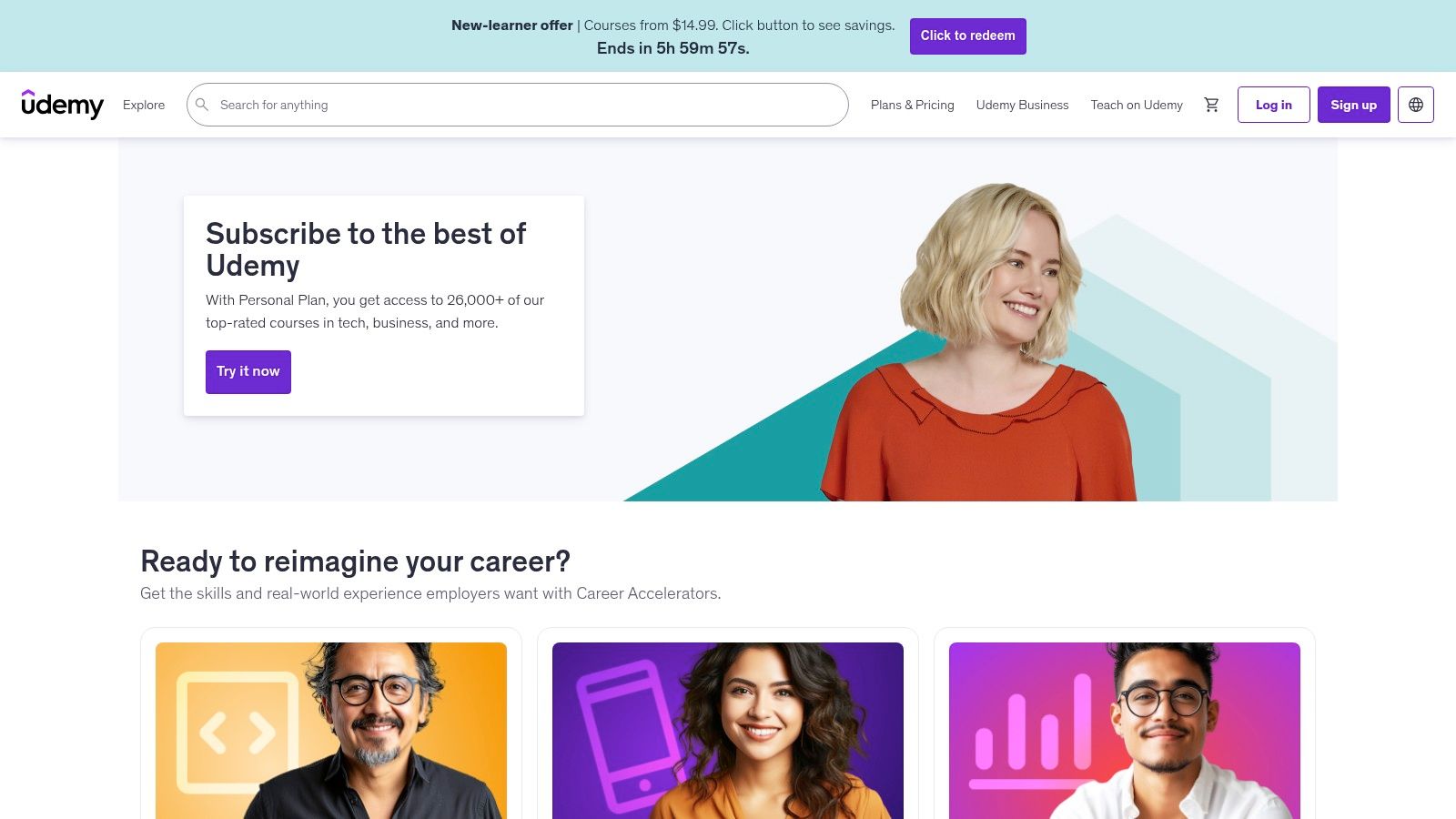
Udemy’s strength is its direct, skill-based approach to learning. You can find courses on everything from wireframing a landing page to coding a functional prototype, often taught by practitioners who have built products themselves. This on-demand model allows learners to acquire just-in-time knowledge to overcome a specific hurdle, whether it's understanding user validation techniques or mastering a new development framework. The platform’s user reviews and rating system also help you filter for the highest-quality content.
Strategic Breakdown & Key Features
Udemy empowers learners by breaking down complex processes into digestible, video-based modules. This makes the journey of building an MVP feel less intimidating and more achievable.
- Large Course Catalog: With courses covering product management, UX design, and various coding languages, you can find instruction for nearly any aspect of MVP development.
- Focus on Actionable Learning: Most courses are project-based, encouraging you to build alongside the instructor and apply concepts immediately.
- Lifetime Access: Once purchased, you retain lifetime access to course materials, including all video lectures, downloadable resources, and future updates.
- Feature Prioritization Skills: Many courses specifically address the core challenge of deciding what to build first. For a deeper dive into this crucial step, you can explore guides on how to prioritize product features.
Access and Pricing
Udemy operates on a per-course pricing model, and courses are frequently available at a deep discount, often making them highly affordable. There are no prerequisites or subscriptions required to start learning. While the quality can vary by instructor, the platform's 30-day money-back guarantee allows users to try courses with minimal risk.
Website: https://www.udemy.com
Minimum Viable Product Examples Comparison
| Platform / Resource | Implementation Complexity 🔄 | Resource Requirements ⚡ | Expected Outcomes 📊 | Ideal Use Cases 💡 | Key Advantages ⭐ |
|---|---|---|---|---|---|
| Strategyzer | Moderate; guided, step-by-step MVP experiment process | Medium; access to paid content for full features | Strong practical validation patterns & MVP testing | Teams building and testing MVPs with structured experiments | Actionable, example-rich, integrates with business models |
| Harvard Business Publishing (HBR) | High; requires reading & structured workshops | Medium; paid cases and limited teaching notes | In-depth, credible case analysis and lean validation | Academic settings, executive education, team workshops | Authoritative, detailed cases with teaching prompts |
| Product Hunt | Low; browsing and community interaction | Low; free access to product launches and feedback | Variable; real-time market and user reaction insights | Finding MVP inspiration and early user feedback | Free, real-time examples with community commentary |
| Indie Hackers | Low to moderate; reading and engaging with community | Low; free access to interviews and discussions | Practical, tactical insights with real startup data | Entrepreneurs seeking candid growth and validation examples | Candid founder insights, free, active community |
| Amazon | Low; self-driven book purchasing and reading | Variable; cost of books, shipping times | Diverse theoretical and practical MVP frameworks | Self-learners seeking comprehensive reading material | Vast selection, multiple formats, customer reviews |
| Coursera | Moderate; structured courses with assignments | Medium; pays per course or subscription | Verified knowledge and skills with certificates | Individuals or teams wanting formal MVP education | University-backed, peer-reviewed, certificate awarded |
| Udemy | Low; on-demand video courses, start anytime | Low; generally affordable, lifetime access | Practical skills with flexible pacing | Quick skill-building in MVP development | Affordable, extensive catalog, downloadable resources |
Build Smarter, Not Harder: Your MVP Action Plan
The diverse minimum viable product examples we've explored, from Amazon's rudimentary book-selling site to Strategyzer's simple PDF downloads, all share a common thread: they prioritized learning over building. Each founder resisted the temptation to create a feature-rich, "perfect" product. Instead, they focused intensely on a core assumption and built the absolute minimum required to test it with real users. This strategic restraint is the essence of the MVP.
What we see across these success stories is a commitment to validating a core value proposition. Amazon validated that people would buy books online. Product Hunt validated the need for a curated discovery platform for new tech. Indie Hackers validated the desire for transparent, behind-the-scenes startup stories. Their initial products were not glamorous, but they were incredibly effective learning machines.
From Inspiration to Implementation
So, how do you translate these lessons into your own venture? The key is to shift your mindset from "What can I build?" to "What do I need to learn?" Start by isolating the single most critical assumption your business relies on. Is it that remote teams will pay for a new collaboration tool? Or that creative agencies need a better way to manage client feedback? Once you identify that core hypothesis, you can design your MVP.
Your next steps should be strategic and deliberate:
- Define Your Core Hypothesis: Clearly articulate the one belief that, if proven wrong, would invalidate your entire business idea.
- Identify Your Target Audience: Pinpoint the early adopters who will provide the most valuable feedback. These are the users who feel the pain point you're solving most acutely.
- Choose the Right MVP Type: As we’ve seen, an MVP doesn't have to be a coded application. It could be a landing page (like Product Hunt), a content-driven platform (like Indie Hackers), or even a service-based "Concierge" MVP.
- Select Your Tools Wisely: You don't need a massive development budget. Leverage no-code platforms, simple content management systems, or even survey tools to get your MVP in front of users. For those ready to implement their MVP, understanding the practical steps is crucial, and you can learn exactly how to create a professional website quickly and easily.
The Ultimate Takeaway
The most powerful lesson from these minimum viable product examples is that an MVP is not just a smaller version of your final product; it's a scientific experiment. Its primary goal is to generate validated learning with the least amount of effort and resources. By embracing this philosophy, you avoid wasting time and money building something nobody wants. You build smarter, not just harder, transforming your startup journey from a gamble into a calculated process of discovery and validation.
Ready to move from idea to validated learning? Bulby helps you run structured experiments to test your assumptions and build products customers actually want. Stop guessing and start validating with Bulby today.

